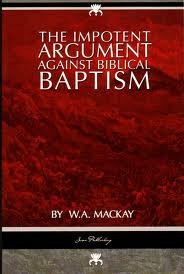| Conclusion: God's covenant has always been for his people and their children. He has always incorporated even newborns in the visible community. At the same time, he has always been clear that it is faith that is required to be his true people, not any outward symbolism. Despite God's requirement for our individual faith, he expressly views the children of his people as distinct. The outward symbolism is then not something we do for God, but a recognition of God's promise towards us and our children. Just as the circumcised Israelite's blood was shed and flesh removed, so a savior's blood would one day be shed to put our flesh to death and to circumcise our hearts. Infant baptism is in keeping with this beautiful theme of including the children of believers in the covenant promise of what God must do for them to be saved, and what God has promised to do should those with the outward sign seek to be in true relationship with him through personal faith. |
Like the Old Testament, The New Testament has little or nothing to say in the way of immersive symbolism, and absolutely nothing to say directly in terms of the mode of baptism. We do know that households were baptized. We do know what the Jewish mind would think about who God's covenant is for. We do know the logistical issues immersionists would have in the mass baptisms or baptisms in dry places, not to mention the issues future generations of Christians would face in following Christ's commands. What do Siberians do to immerse themselves? What do nomads or those who live in sparsely watered areas do to immerse themselves? What have some North Koreans who have been under close watch or who have been converted in prisons do to immerse themselves? We do know that the passages that seem to link baptism with the idea of burial or resurrection are also linked with the Spirit and consecration or washing. We do know that the earliest records of church history seem to indicate that infant baptism was an accepted practice. In fact, it isn't until the mid 1500's that we really see immersion and believer's baptism come on the scene with force, in what seems to be an overreaction favoring personal decision because of the tyranny believers had experienced within the overbearing and corrupt church at the time. Immersionists simply swung the pendulum too far as humans are prone to do, throwing off too much church tradition and losing biblical continuity for personal interpretation. Rather than throwing off only the late creations of man (e.g. indulgences), the immersionists threw off a well established practice that is much easier to link to the Bible and the Apostles than their immersionist mode and method.
The context of everything screams for the symbolism of moving water, and screams for the inclusion of our children. While this isn't a primary issue in Christianity, it is extremely important. Baptism is one of the two sacraments many protestants recognize, and we take the other sacrament, the Eucharist, pretty seriously. God intends to speak to us through the sacrament of baptism as well as through the Eucharist. In fact, all denominations but some of the modern Evangelical denominations view the sacraments as a special means of grace given by God. While it’s too long to explain what that means here, in essence, the majority of the church for the majority of history have viewed the sacraments as being a special means of real grace that God gives to his people. To the majority of the church, the sacraments aren’t just symbols, they’re God’s real interaction in a mysterious way with his people. It is vital that we listen to what he says as he says it, not turn his symbolism and interaction with us into what we think it should be, potentially turning the godhead into a hierarchy that emphasises the work of the Son and diminishes or subordinates the work of the Spirit.
The evidence, to me, shows that baptism represents a promise of God for his cleansing to come upon me and wash me - to consecrate me to himself - a promise he gives to my children as well if they come to a faith in him, and as they even now are - through both heritage and practice, are a part of the visible church and called holy by God (I Corinthians 7:14). While I understand where immersionists are coming from, I often feel as though this aspect of the view of children is what hurts their position the most. A Christianity that views children as distinct from the church until their faith is declared tends to treat children differently. Whether stated or unstated, children are outsiders. That message they receive - whether explicitly stated or merely implied - I believe has a significant impact on them. There is a great satire on the way we often view children today in our culture (here and here) and hits on the potential message we send our kids by viewing them as not yet part of the visible community and holding them up to the standard of "Christian" even before they profess faith, despite nearly all of church history contradicting such a methodology. While no Christian parent intends ill for their child, the way we believe God views our children is vital to shaping how we view our children as well as how we view our God. I believe that a theology of baptism that incorporates children is not only most biblical, but also helps us to create a view of children that is less dismissive, less patronizing to them, has higher and more appropriate expectations, and is more spiritually healthy.
In the end, the most important thing is that you trust in Christ as your lord and savior and that you obey his command to be baptized and discipled. That is why I love our denomination's stance on baptism. If you come from the baptist church down the road where you were immersed after a profession of faith, we won't baptize you again. In a somewhat similar vein to the Augustinian response on the Donatist controversy, we recognize that the power of the sacrament of baptism isn't in the mode or the one administering the sacrament, but rather in the source of the sacrament - God himself. Whether you were baptized in a Methodist, Lutheran, Baptist, Orthodox, or Catholic church - whether you were baptized by immersion, sprinkling, or pouring - or whether you were baptized by a serial killer pastor or Jesus himself - it doesn't matter. So long as the baptism was administered in good faith (baptism by a priest of Satan, baptism in a universalist church if they do that thing, baptism by an unordained five year old sibling, etc) without a reason to doubt that it was done in the name of the trinity, we won't baptize you again. Baptism is from God. While we believe the symbolism he intends is meaningful and important, to place more burden and requirements on this symbol would seemingly undercut the beauty of the grace God intends to show us through it. I pray you will consider this issue beyond what God requires of you and figure out what God is trying to teach you and lovingly show you through his commands. He is a wise teacher who loves us and our children.
Resources:
Naked Bible Podcast: This podcast does a great job of summarizing some of the key aspects of baptism. There are 12 or so mini episodes (5-10 minutes) and you can pick and choose which ones might be of particular interest to you.
Testimony of a Paedobaptist - This is a good article that discusses why a pastor changed views from immersion to paedobaptism (infant baptism). He doesn't take the discussion as broadly as I've laid out above, but he takes some of the points and goes into more depth.
William the Baptist - A step by step approach using story format focusing mainly on sprinkling and pouring. This is from the 19th century and may be a bit difficult to read.
The Impotent Argument Against Biblical Baptism - A more logical and partitioned argument focusing mostly on infant baptism. This is from the 19th century and may be a bit difficult to read.
Why Baptize by Sprinkling - A good look at the mode of baptism. This book does a particularly good job looking at the semantics of the text, particularly at the meaning of the word baptizo.
Difficulties About Baptism - This takes a pretty comprehensive look at baptism, as I hope I have done. The author may provide different nuances that may be helpful.
PREVIOUS: Part 6: Counter-Rebuttals





 RSS Feed
RSS Feed